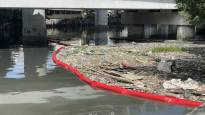The Finnish-based Riverrecycle Oy has developed a method to control the plastic waste plaguing the seas. Together with its partners, the company has collected one million kilos of garbage from the rivers of developing countries in a few years.
The Finnish start-up’s invention has succeeded where many others have not yet: in removing plastic waste from waterways.
The invention is not complicated: a floating boom that stops the plastic waste and a device to lift it to the beach. The actual innovation is a business model that makes garbage collection economically viable.
– We have lifted one million kilos of waste from four rivers around the world – and we are constantly lifting more than 80,000 kilos per month, says the founder and CEO of RiverRecycle Oy, a serial entrepreneur Anssi Mikola.
UN environmental program according to UNEP 19–23 million tons of plastic waste ends up in seas, rivers and other bodies of water every year.
– We have developed a working solution with which we are able to stop the plastic waste traveling in the rivers of developing countries before it ends up in the oceans, says Mikola.
Waste ends up in the river mainly for one reason: waste management in developing countries does not work. Local garbage collectors do collect valuable plastics, such as drinking bottles made of PET plastic. Everything else is deliberately dumped into the river. Poverty drives environmental awareness.
– Specifically to the river, because the river is the cheapest way to get rid of waste. When you throw in the river, the garbage disappears with the river and you don’t have to pay landfill fees.
Even though about 80 percent of the trash in the river ends up in the river basin, a change in attitude is the most important.
– People say that you are changing things in the right direction. This activity gradually gives them a sense of self-worth, says Riverrecycle’s Mumbai project manager Yashwant Dadhwadia.
The ten most polluting rivers carry up to 15 percent of all the plastic waste that rivers take into the oceans. Riverrecycle is now operating in four Asian rivers, and the Fifth Putsari is currently under construction in Bangladesh.
The plan is to stop the flow of garbage in the majority of about a thousand of the world’s dirtiest rivers.
– If we can stop the garbage flows in the rivers, then about half of the waste going into the sea can be stopped. Our plan is to have 75 percent of all rivers managed, says Mikola.
Riverrecycle is a special start-up in that it has made a profit from the beginning. However, the purpose is to make river cleaning and river cleaners unnecessary and to make waste management in developing countries work.
In addition to the fact that the company collects plastic waste from the river, it is actually collected more from land.
– The ultimate goal is for the recycling business for low-value plastic to grow so large that it no longer sinks into the river. We strive to buy everything that is thrown into the river so that it is no longer thrown into the river. Then, when the business model is ready some tens of years from now, there should be no need for river pumps anymore.
Installing garbage collection devices in rivers has not been an easy task. Originally, no one wanted them on their land and waterways when Riverrecycle started negotiations with the local authorities.
– There are quite a few parties involved: the city, a potential buyer, i.e. the financier, the river’s administrative authority and the national authority. It is a puzzle to make this desirable for everyone, Mikola describes.
The problem of plastic waste in water bodies is so big that there are many parties who want to be involved.
– In practice, we sell the different results of the project to several parties. One wants jobs there, another wants plastic waste out of the river, a third wants municipal waste collection to be solved.
In the Philippines, for example, legislation is also failing to deal with littering. Producers of plastic waste are becoming responsible for recycling the same amount of plastic that goes to the market.
– When recycling has intrinsic value, it starts to pay off better financially, says Mikola.
Riverrecycle is also involved in developing plastic reuse. Currently, waste plastic is pressed by heating the construction board.
See also: The problem of plastic waste in the world’s oceans can be seen in the island nations of the Pacific Ocean, where uninhabited beaches are filled with plastic. In the Marshall Islands, the garbage collected from the beach is taken to the garbage mountain, which is the highest point in the state.
